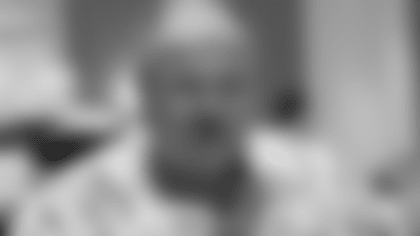As the NFL Owners Meetings continue in Orlando, Florida, earlier this morning, Chiefs head coach Andy Reid met with the media, during the AFC Coaches Breakfast; below is the transcript of coach's Q & A session.

Q: How was it different coming to Kansas City versus Philadelphia?
REID: "I had two different situations. I came in as kind of an unknown in one spot, Philadelphia, but in Kansas City, the players kind of knew who I was coming in. It was two different dynamics. I think the most important thing is they sense honesty and some form of trust that you're going to help them become the best team they can be and individually, the best players they can be."
Q: How do you present yourself to the team?
REID: "I think you need to be yourself. Whatever presentation you take to a player, to the team – to the coaching staff first, and then the players second – but whatever you take to them, that it's organized and that you're confident in it."
Q: What about the balance between rules and letting the players be themselves?
REID: "I guess there are probably parameters that you hit on before that, but for the most part, if the players are feeling too much restriction, you're not going to get their full genius in the right place, so you have to allow them to move around a little. It's kind of like stopping at a red light; we know if we go, there are going to be problems. There have to be parameters or it'd be chaos, but not enough to where you squash the creativity."
Q: How do you keep the players engaged in team meetings?
REID: "I think that's a tough challenge. What I tell the guys is, I have these little 3X5 cards and, if I can't get it on that card, they're not going to hear it. They're not getting the same story over and over and over again."
Q: What do you do in the offseason to grow?
REID: "I think you're always growing in the business. I think that's important, so you don't get stale. I like to read. I like to listen to people that I think have a clue professionally in life, in different businesses."
Q: Do you still read the newspaper?
REID: "I like reading the newspaper."
Q: Is there anyone in particular that you've read recently?
REID: "Have you ever read the Blanchard books, business books? I try to read business books. I try to read some spiritual books, something related to my religion and then something for pleasure (so I can) grow in different areas. (Ken) Blanchard writes a lot of the business books, simple, easy reads."
Q: What do you think about Branden Albert?
REID: "An all-pro player, a great person. (They're getting) somebody who's good in the run and pass game and a good teammate."
Q: What do you think about Akeem Jordan?
REID: "Akeem (Jordan) is a good, solid player, a phenomenal special teams player. He makes all the calls defensively and just brings a certain stability to the football team, in the locker room and on the field. (He's a) smart kid."
Q: What was the difference in roles for Akeem Jordan in Philadelphia and Kansas City?
REID: "He was full-time for me in Kansas City, he did it a little bit and he was kind of the sixth man in Philadelphia. I trust that he can play any position and there wouldn't be a big drop-off."
Q: Is that due to his preparation or what?
REID: "He has good football smarts."
Q: Do you use a printed playbook or iPads?
REID: "We do both. For the players, they're on iPads, once when they get into the season. This offseason, we might be experimenting with giving them iPads for the offseason program."
Q: How many pages are your playbooks?
REID: "Both of them are actually similar, offensively and defensively. They're probably two inches thick, how many pages that is, I don't know."
Q: What did you think about the change this past season for Philadelphia and Kansas City?
REID: "I thought change would be good for both sides. I thought Chip (Kelly) would bring something in fresh, exciting for the players that were back healthy, being they had a good nucleus of guys. I thought I went into a situation in Kansas City, where change could possibly be good, too, and I had a good nucleus of players. So, I thought for both sides that worked out well. I feel the same way today. I'm glad both teams did well."
Q: What is your working relationship with John Dorsey?
REID: "It's been great. John and I had a history before, and I love his approach. He came in and brought the whole organization together with his personality. He's a tough guy; we all know that, but yet, he's got this personality, where he just includes everybody. Everybody is a part of it. He makes everybody feel a part."
Q: Do you like having less on your plate now that you have Dorsey as the GM?
REID: "I love it. For where I'm at in my career, I love it. I loved doing what I did in Philly. But, I just wanted to get back into coaching. I hadn't done much of that for a few years and that's why I got into the business. It was great to get back in and dive in and be able to be in the offensive meetings, the install meetings, call the plays and all that stuff."
Q: How difficult is it to make free agency work long term for a team?
REID: "Listen, I'm not a huge free agency guy. I don't think you build a team that way. I think you build it through a draft. There are so many elements that go into a player actually fitting into your program and being successful, that if you get them right when they're peaking in that system and then you disrupt that and move them on to another system, that can be tough. So, the percentage has dropped, the success rate has dropped. I think you spot a guy here or there and then you have the other element that it has the chance to disrupt your locker room. This guy has been with me for ten years and is making X amount and then all of the sudden, you bring in a free agent who might be as good, but maybe not as good, and you're paying him way up here and all of the sudden you have this whiff that goes on in the locker room. I think you have to be real, real careful on who you bring in and how you do it."
Q: Do you have a sense of satisfaction looking back on how Michael Vick has changed?
REID: "I'm so happy for him. Number one, I'm happy he's back with (Jets offensive coordinator) Marty (Mornhinweg). I think he had a great experience with Chip (Kelly), and he's got an opportunity to finish up his career (with the Jets). He's not getting any younger, but he still can sling that son of a gun like no other and still can move around. I think he has a passion for the game. I also think he'll be great for the young kid (Geno Smith) at the Jets."
Q: Is there any truth to the rumor of you bringing in WR Jason Avant?
REID: "Listen, he's a top-notch kid. When he was released, I had a chance to talk to him on a personal standpoint. Potentially down the road, but we'll just see how it works out."
Q: So nothing on Avant right now?
REID: "I don't have anything on it right now. But you guys know, he's a top-notch kid."
Q: On how important backup quarterbacks are, considering what happened in Green Bay this season.
REID: "I know Mike (McCarthy) feels it's important. That guy is one play away from being your guy. That's just how it is. I've experienced that in Philadelphia. There was a year where we went through three guys. Maybe I learned early that you better have someone. I think we were all spoiled by (Brett) Favre who never missed a game. Donovan (McNabb) stepped in with very few misses, but he did do a couple of things in there."
Q: Do you remember your first media breakfast in 1999?
REID: "I've had a few crazy things happen here sitting at these tables. My first one, the year we took Donovan (McNabb), Mike Ditka was sitting over there and said I'll give up my whole draft for that guy's pick, right there and like a ninja, all the reporters that were around him, it was like a funnel cloud, wooom, right over to my table."
Q: Where do you stand on the replay proposal that expands what can be reviewed?
REID: "I think there are probably pluses and minuses to everything. It's pretty cut and dry right now on what you can do and what you can't do. I know there was a general philosophy when replay was put in on trying to keep the subjective things out of the picture to make it as cut and dry as you possibly could. I guess it's mushrooming out from there. I could see either way. I like keeping it tight, but that's alright, that's how it works."
Q: So having more decisions would be okay?
REID: "Well, there's a plus and a minus to it. There would have to be a change in the procedure. You could say everything's challengeable. That's okay. That's pretty easy, but it opens up quite a little bit of subjectivity in there."
Q: What was it like coaching DeSean Jackson?
REID: "I have nothing but positive things to say about him, really any of the guys on that team."
Q: On coaching Michael Vick and DeSean Jackson.
REID: "I love both of those guys. Both of them were great for me, when I was there."
Q: What did you see Vick do as far as personal growth?
REID: "Michael worked hard. He made that a point coming out. He wanted to handle the game differently than he did prior to being incarcerated. To me, he just had a completely different approach to the game and that was a pleasure to deal with."
Q: How did Vick do that?
REID: "He worked. He got in early. He had a couple of things he had to overcome. He was out of football shape when we first got him. He had to drop 15 pounds or something. At the same time, he had to learn this offense, and he just dedicated himself to that. He didn't have a lot of distractions. There was nobody tugging on him. Expectations were down here as opposed to up here."
Q: What about working with different types of players?
REID: "We work with all kinds of people and as coaches, we're all kinds of people. We're just a microcosm of life. Shrink down life and that's your locker room, that's what it is in a little smaller version. It's all of the same issues, challenges, relationships, all of those things. They're all the same."
Q: What about working with defense and offense and the coordinators?
REID: "I think from a player's standpoint, it's important that they know that you care about that defensive side if you're an offensive guy and vice versa and inevitably, you are responsible for that as the head football coach. With (Eagles defensive coordinator) Jim (Johnson) and Bob (Sutton) and the other offensive coordinators that I've had, is I want to know what you're doing. If I have something I'll throw it at you. I'm still going to let you do your job, which I think is important, but there are certain kind of guidelines that I'd like to have and then go roll. Let your personality get into it and have at it."
Q: Is it easier finding 3-4 outside linebackers than 4-3 defensive ends?
REID: "I think it's hard to find pass rushers period. I don't think those guys are easy to find. The one transition that I think is an important one in the 3-4, is those outside linebackers get to practice dropping. When you go into a nickel, you're right back into a four-man front. It gives that defensive coordinator flexibility. So as you transition from the 3-4 to the nickel, those guys know that if you want to run a fire-zone, they know exactly where to go and how to cover. They've worked those drills during the week and it gives you a little more flexibility."
Q: What did you learn from Alex Smith?
REID: "I don't think you know a player until you have him. You do all your homework. But until you get him there, you don't realize. You've heard he's a great leader, but until you get him and work with him, you don't know that. You've heard about his strengths and weaknesses as a player, but until you get him and he's doing your stuff, I don't think you figure that out completely. I loved his accuracy. I love his want-to to be great. I love the way he took things over and challenged everybody around him and not in a boisterous manner but just by leading by example and teaching on the field. I appreciated his whole game. His approach to the game raised the whole team. He's a gym rat. You've got to kick him out of the building. I was almost on secret double probation his first week in the building, because he wanted to stay there forever and I'd have to kick him out. I said, 'You gotta go.' That's how he approaches the game."
Q: Did Jamaal Charles surprise you at all?
REID: "I had talked to Charlie Weis, before I took the job and Charlie had been there and kind of used Jamaal (Charles) in different spots. He still surprised me that he could catch that ball. He's like the wide receiver out there, running routes, all of those things. He just does it so easy."
Q: How does he get better from last year?
REID: "I saw progress all the way through the season, whether it was just subtleties in the run game and the blocking schemes and that to the route running. We were able to kind of expand his package as we went. I just think that will continue on."
Q: How do you work Knile Davis into the mix?
REID: "I think Knile (Davis) is a big part of it and he ended up being a big part of it. I was able to actually give Jamaal (Charles) a blow, because of Knile's progress. I thought Knile picked it up quite a bit, too. (He's a) big, strong kid too.
Q: On DeSean Jackson.
REID: "I have nothing but good things to say about the kid. I did draft him. I had a great relationship with him, when his father passed away, that was a hard thing for him to go through at a young age. They were best friends. I've experienced life things with him, so I would tell you, he was great for me when I was there."
Q: Do you find it hard to believe, given what you know about him and seeing what he did in that offense last year, that they would be looking to trade him?
REID: "I don't know what's real and what's not real. I haven't looked into it either way. I've stayed away; I don't really care about that, so I don't know what's real and what's not real. I'm happy that he had a great year. I'm happy that Chip (Kelly) had a great year with him and that's where it stops for me."
Q: Do you see an Alex Smith contract before this season?
REID: "We'll see how that goes. I'm out of that business right now, but (John) Dorsey will probably comment better for you."
Q: What improvement did you see in Alex Smith?
REID: "I think he just got more comfortable with the offense and the people around him. That takes a little bit of time, and I think after the bye week, after nine games, it started kind of taking off for him and the rest of the guys around him. I think that everybody had a better feel. We knew as coaches kind of what the guys did well."
Q: Do you think he fit as well in the system as you thought he would?
REID: "Yeah, I think he did. I got to see him—we played him a bunch in Philadelphia— so I got to see his maturation process. Then I saw him go through the different coaches. He got with (Jim Harbaugh) and it just took off for him. Our offense is similar in a lot of ways with the things we ask him to do, so I felt like he could jump in. (I knew) if we gave him a little bit of time to get his feet wet, he'd be fine."
Q: Is it hard to get a team to bounce back mentally after blowing such a big lead in a playoff loss?
REID: "I think it's a great lesson to learn, and something that will help us in the future this coming season. We were a young team, second-youngest in the league or somewhere in there. You live and learn. You can't take your foot off the accelerator against any team in this league, let alone a good football team like Indy, and win the game. You learn from it and move on."
Q: Where is Eric Fisher going this season?
REID: "Right now, I think I'm going to move him to the left side. That's where he played in college, although Donald Stephenson played there for me and I know he can do that too, but I think I'm going to start off with Eric at left and keep Donald at right and then we roll."
Q: How do you change as a coach?
REID: "You kind of have your base fundamentals that you believe in, but there's always change. You have to maintain some flexibility and that's all part of life. I'm growing older and the players are growing younger. Isn't that how it works? But you keep it open, you keep it real. Be honest. Those kinds of things don't change."
Q: What do you need to work on to get better next season?
REID: "We need to keep growing. We need a good influx of some more players, that's just how it works. We have to do a better job of coaching to take it to that next level. (We need to) continue to challenge and teach. Those are important things. I thought we were headed in the right direction as the season (went on), kind of after the bye week; those are kind of the primary things."













